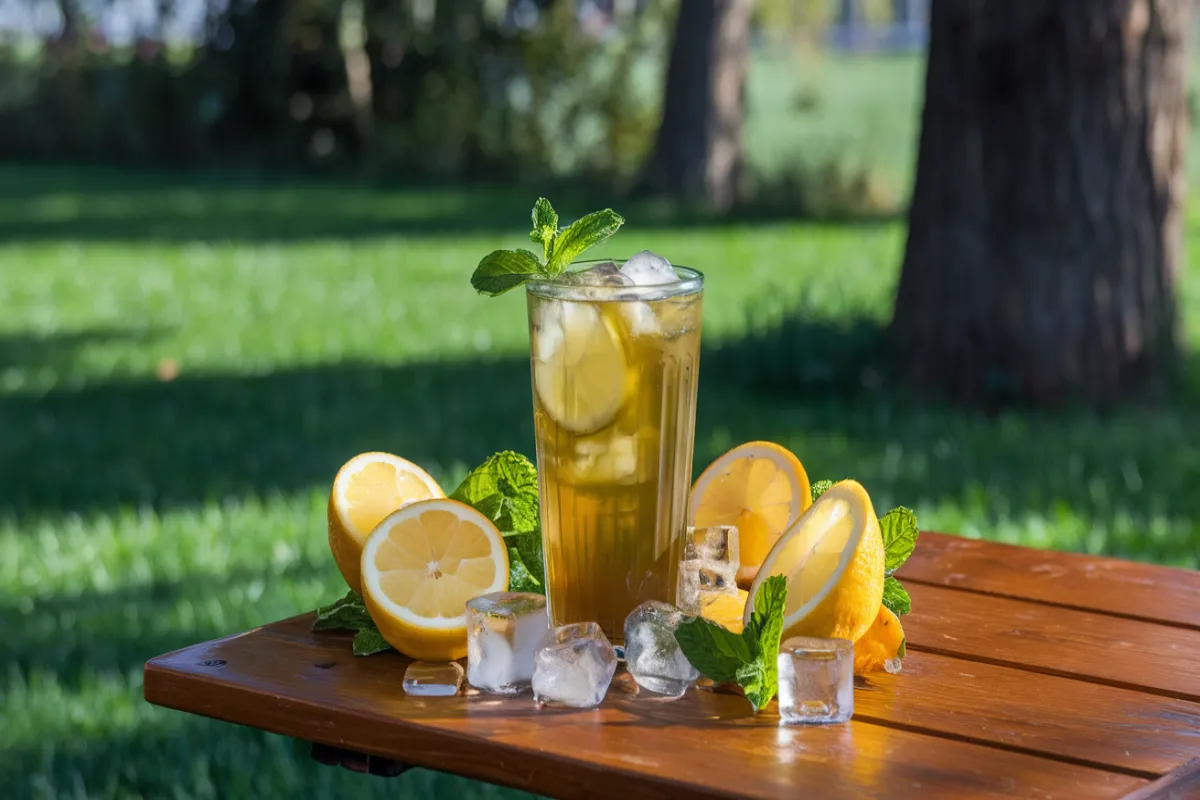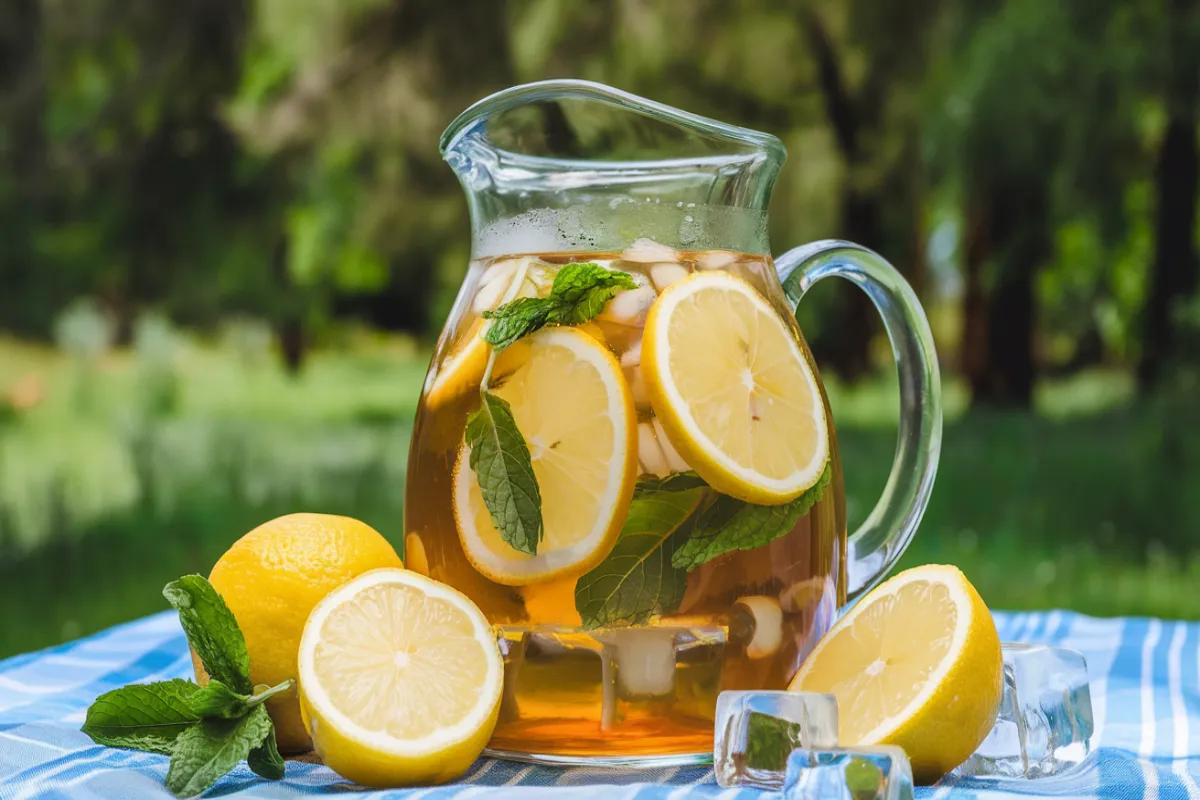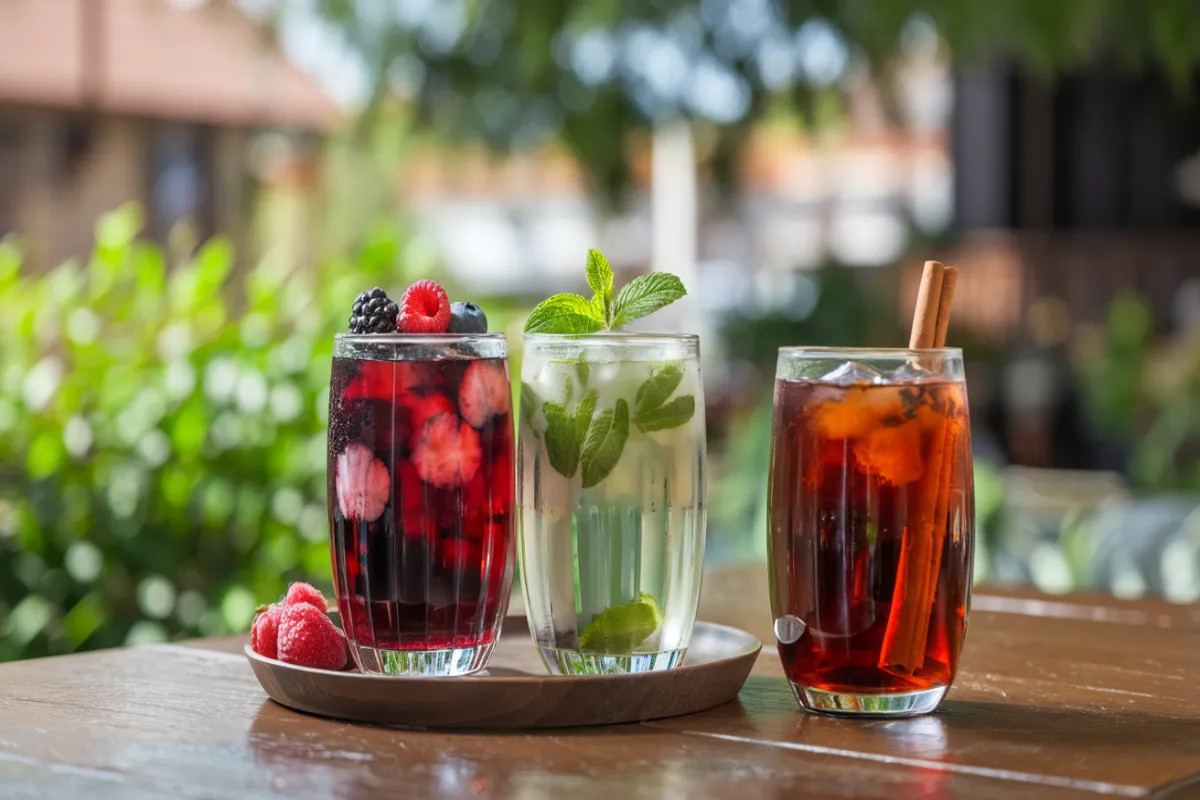Table of Contents
- What Makes Cold Tea Healthy?
- Top 5 Healthiest Cold Teas
- Green Tea
- Hibiscus Tea
- Peppermint Tea
- Rooibos Tea
- Ginger Tea
- Benefits of Drinking Cold Tea Daily
- Cold Tea and Hydration: Why It Matters
- How to Prepare the Healthiest Cold Teas
- Cold Tea Recipes to Try
- Cold Tea vs. Other Beverages
- FAQs
- Conclusion
Introduction
When it comes to refreshing and hydrating beverages, cold tea is a staple for many people around the world. Whether you’re sipping on iced green tea or indulging in a fruity herbal tea, there’s no doubt that cold tea offers a refreshing escape from sugary sodas and artificially flavored drinks. But with so many types of tea available, you might be wondering, what is the healthiest cold tea to drink?
In this article, we will explore the various types of cold teas, their unique health benefits, and how to incorporate them into your daily routine. From the antioxidant-packed green tea to the soothing and calming peppermint tea, we’ll uncover the healthiest options that not only taste great but also offer numerous benefits for your health.
What Makes Cold Tea Healthy?
Cold tea is not only a thirst-quenching drink, but it also provides several health benefits when brewed and consumed correctly. When discussing the healthiness of cold tea, we must focus on the core elements that make this drink so beneficial:
- Rich in Antioxidants: Many cold teas, especially green tea and black tea, are abundant in antioxidants such as catechins and flavonoids. These compounds help neutralize free radicals in the body, reducing oxidative stress and lowering the risk of chronic diseases like heart disease and cancer.
- Low-Calorie Hydration: Unsweetened cold teas are naturally low in calories, making them an excellent alternative to sugary drinks like sodas and fruit juices. Hydration plays a vital role in overall health, and cold tea offers a flavorful and healthier way to meet your daily water intake.
- Natural Ingredients: Chemical-free cold teas that are brewed at home from natural or organic ingredients contain no artificial sweeteners, flavors, or preservatives, allowing you to enjoy a pure and healthy beverage.
- Supports Metabolism and Energy Levels: Certain teas, such as green tea and black tea, contain a moderate amount of caffeine, providing a natural energy boost without the crash often associated with coffee or sugary energy drinks. Caffeine can also help enhance mental focus and improve metabolism.
- Supports Digestive Health: Herbal teas like peppermint and ginger tea are known for their digestive benefits. They help soothe an upset stomach, reduce bloating, and alleviate symptoms of indigestion, making them perfect for after meals or anytime you need digestive support.
With all of these benefits, it’s clear that cold tea can be a healthy addition to any diet. But which types of tea stand out as the healthiest options? Let’s explore.

Top 5 Healthiest Cold Teas
1. Green Tea
When discussing the healthiest teas, green tea always tops the list. This tea is loaded with catechins, particularly epigallocatechin gallate (EGCG), a powerful antioxidant known for its potential to fight cancer, reduce inflammation, and support heart health. Green tea is also known for its metabolism-boosting effects, which may aid in weight loss and fat burning.
In addition to its antioxidant content, green tea contains L-theanine, an amino acid that promotes relaxation and reduces stress without causing drowsiness. This makes green tea a fantastic option for improving mental clarity and focus, while still offering a calm energy boost.
Health Benefits of Green Tea:
- Promotes heart health by lowering cholesterol and blood pressure.
- Aids in weight management by boosting metabolism and fat burning.
- Contains antioxidants that protect against oxidative stress and inflammation.
- Supports brain function and reduces the risk of neurological disorders like Alzheimer’s disease.
How to Enjoy Cold Green Tea: Brew your green tea and allow it to cool before serving it over ice. For added flavor, consider infusing your tea with fresh lemon slices, mint leaves, or a drizzle of honey.
2. Hibiscus Tea
Made from the dried petals of the hibiscus flower, offers a tart and tangy flavor that is both refreshing and healthful. This bright red tea is particularly known for its ability to lower blood pressure. Studies have shown that regular consumption of hibiscus tea can significantly reduce systolic and diastolic blood pressure, making it an excellent option for those looking to support cardiovascular health.
Hibiscus tea is also rich in vitamin C, an essential nutrient that boosts the immune system and supports skin health. Its high antioxidant content helps reduce inflammation, support liver function, and improve overall well-being.
Health Benefits of Hibiscus Tea:
- Helps lower blood pressure and supports heart health.
- Rich in antioxidants and vitamin C.
- May support liver health by promoting detoxification.
- Caffeine-free, making it suitable for any time of day.
How to Enjoy Cold Hibiscus Tea: Brew a batch of hibiscus tea, let it cool, and then serve it over ice. For a more tropical twist, add fresh berries or a squeeze of lime juice.
3. Peppermint Tea
Peppermint tea is not only delicious but also highly beneficial for digestive health. This naturally caffeine-free herbal tea contains menthol, a compound that relaxes the muscles of the gastrointestinal tract, helping to alleviate symptoms of bloating, indigestion, and even nausea. Peppermint tea is an excellent choice for those looking for a calming and cooling drink, especially after a meal.
Additionally, peppermint tea has antimicrobial properties that can support oral health and help freshen breath.
Health Benefits of Peppermint Tea:
- Eases digestive issues such as bloating, indigestion, and gas.
- Caffeine-free, making it a great option for late in the day.
- May improve concentration and relieve stress.
- Contains antioxidants that support overall health.
How to Enjoy Cold Peppermint Tea: Brew peppermint tea, let it cool to room temperature, and then refrigerate. Serve over ice with a slice of cucumber or sprig of mint for an extra refreshing boost.
4. Rooibos Tea
Also known as red tea, is a caffeine-free herbal tea from South Africa. Rooibos is packed with polyphenols, powerful antioxidants that help fight inflammation and protect the body from oxidative damage. It’s also rich in quercetin, a flavonoid known for its heart-healthy benefits, particularly its ability to lower blood pressure and improve circulation.
Rooibos is naturally sweet, making it a popular choice for those who want a flavorful iced tea without added sugar. It’s also gentle on the stomach and suitable for people with caffeine sensitivities.
Health Benefits of Rooibos Tea:
- Caffeine-free and rich in antioxidants.
- May reduce inflammation and support heart health.
- Naturally sweet, so it doesn’t require added sugar.
- Supports digestion and is gentle on the stomach.
How to Enjoy Cold Rooibos Tea: Brew rooibos tea, allow it to cool, and serve over ice. For an extra boost of flavor, add a cinnamon stick or a splash of vanilla extract.
5. Ginger Tea
It’s well-known for its anti-inflammatory and digestive benefits. Ginger has been used for centuries to alleviate nausea, reduce bloating, and improve digestion. It’s particularly beneficial for those experiencing motion sickness or morning sickness.
Ginger tea also helps boost the immune system thanks to its high levels of gingerol, a bioactive compound that has anti-inflammatory and antioxidant effects. This tea is ideal for those looking to improve digestion and support overall immune health.
Health Benefits of Ginger Tea:
- Reduces inflammation and supports digestive health.
- Eases nausea and motion sickness.
- Boosts the immune system.
- Caffeine-free, making it suitable for any time of day.
How to Enjoy Cold Ginger Tea: Brew fresh ginger tea, let it cool, and serve over ice with a slice of lemon or a splash of lime juice for a zesty, refreshing drink.

Benefits of Drinking Cold Tea Daily
Incorporating cold tea into your daily routine offers numerous benefits beyond hydration. Let’s explore how daily consumption of cold tea can improve your overall health:
- Hydration Without the Extra Calories: Cold tea is an excellent way to stay hydrated without adding extra calories or sugars to your diet. Unsweetened iced teas are naturally low in calories, making them a healthy alternative to sugary drinks.
- Improved Metabolism and Weight Management: Certain teas, particularly green tea and oolong tea, have been shown to enhance metabolism and aid in weight loss. The catechins and caffeine in these teas stimulate thermogenesis, the process by which your body burns calories to produce heat.
- Better Digestion: Herbal teas like peppermint and ginger tea are especially helpful for improving digestion. By drinking these teas regularly, you may experience relief from bloating, indigestion, and nausea.
- Boosted Immune System: Many teas, particularly green tea and hibiscus tea, contain high levels of vitamin C and antioxidants, which are essential for a strong immune system. Regular consumption of these teas can help protect your body from illnesses and infections.
- Reduced Risk of Chronic Diseases: The antioxidants found in teas, such as polyphenols and flavonoids, play a key role in reducing inflammation and protecting the body from chronic diseases like heart disease, diabetes, and certain cancers.
Cold Tea and Hydration: Why It Matters
Hydration is essential for maintaining optimal health, and cold tea offers a flavorful way to ensure you’re meeting your daily hydration needs. While water is the best way to stay hydrated, cold teas provide an added layer of health benefits, from antioxidants to digestive support, without compromising hydration.
By choosing unsweetened, naturally flavored cold teas, you can hydrate your body while also reaping the benefits of a low-calorie, nutrient-rich beverage.
How to Prepare the Healthiest Cold Teas
The key to preparing the healthiest cold teas is to use high-quality ingredients and avoid added sugars and artificial sweeteners. Here’s a step-by-step guide on how to make the healthiest cold teas at home:
- Choose Organic, Loose-Leaf Teas: Start with organic loose-leaf tea or tea bags to ensure that your tea is free from pesticides and artificial flavors.
- Brew Correctly: Use filtered water and follow the specific brewing times for each type of tea to avoid oversteeping, which can make the tea bitter.
- Sweeten Naturally (if needed): If you prefer a sweeter iced tea, opt for natural sweeteners like honey, maple syrup, or stevia instead of refined sugar. Keep the sweetness minimal for the healthiest option.
- Add Fresh Ingredients: Enhance the flavor of your cold tea with natural additions like lemon slices, mint leaves, or fresh berries. These will add flavor without the need for artificial additives.
Cold Tea Recipes to Try
Here are a few cold tea recipes you can easily make at home:
1. Lemon Mint Green Iced Tea
- Brew 4 cups of green tea and allow it to cool.
- Add slices of fresh lemon and a handful of mint leaves.
- Serve over ice for a refreshing, antioxidant-packed drink.
2. Hibiscus Berry Iced Tea
- Brew 4 cups of hibiscus tea and let it cool.
- Add fresh raspberries or blueberries and a splash of honey.
- Chill and serve over ice for a tangy, fruity treat.
3. Spiced Rooibos Iced Tea
- Brew 4 cups of rooibos tea and allow it to cool.
- Add a cinnamon stick and a dash of vanilla extract.
- Serve chilled over ice for a sweet and spiced flavor.

Cold Tea vs. Other Beverages
Compared to sugary sodas, fruit juices, and even coffee, cold tea stands out as a healthier alternative. Unlike sugary drinks, which can contribute to weight gain and insulin resistance, unsweetened cold teas offer a low-calorie option that’s packed with beneficial nutrients.
Moreover, the caffeine content in green tea and black tea is significantly lower than that of coffee, providing a more moderate and sustained energy boost without the jitters or crashes.
FAQs
1. Can I drink cold tea every day?
Yes, cold tea can be consumed daily, especially if it’s made from natural, chemical-free ingredients. It’s a great way to stay hydrated while enjoying the health benefits of various teas.
2. Is unsweetened iced tea healthier than sweetened?
Yes, unsweetened iced tea is healthier because it doesn’t contain added sugars, which can contribute to weight gain and other health issues. If you prefer sweetness, opt for natural sweeteners like honey or stevia.
3. Does cold tea lose its antioxidants when chilled?
No, chilling tea does not significantly reduce its antioxidant content. You can enjoy the same health benefits in iced tea as you would with hot tea.
Conclusion
Cold tea is a versatile and healthy beverage that offers numerous health benefits. Whether you prefer the antioxidant-rich green tea, the heart-healthy hibiscus tea, or the soothing peppermint tea, there is a cold tea option to suit every taste and health goal. By making your own chemical-free iced tea at home with natural ingredients, you can enjoy a refreshing drink that supports your well-being without added sugars or artificial flavors.
So, next time you’re looking for a cool and healthy beverage, reach for a glass of cold tea. Not only will it quench your thirst, but it will also provide your body with a range of nutrients and antioxidants to keep you feeling your best.

